-
TSA could begin searching for explosives hidden inside you
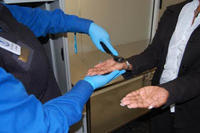
Government intelligence officials are now warning airlines that terrorists could be using surgically implanted explosives to bypass security measures; there is no information regarding a specific plot or threat, but airlines could begin to implement additional screening procedures as the current body scanners cannot effectively detect bombs hidden inside an individual; last year, al Qaeda operatives in Iraq implanted two dogs with explosives, but the dogs died before they could loaded onto a U.S.-bound plane
-
-
Lapses in airport security spark concern
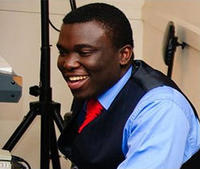
Representative Pete King (R-New York), the House Homeland Security Committee chair, is blasting the Transportation Security Administration (TSA) for two recent lapses in screening procedures at airports; a Nigerian man flew across the country using an expired boarding pass without TSA agents noticing; in a separate incident, a passenger boarded a flight without having their boarding pass checked; Senator Charles Schumer (D-New York) is pushing for TSA to adopt technology that would allow security officials to scan ID documents to minimize fraud
-
-
Stopping terrorists from using fake IDs at airports

Steve Williams, the CEO of Intellicheck Mobilisa, a technology company that develops wireless identity systems, was recently interviewed by Homeland Security NewsWire’s executive editor Eugene Chow; Williams discusses the ease with which criminals and terrorists use false documents to travel, how pervasive the problem is, and solutions to help stop it
-
-
New airport scanner can detect liquid explosives
Passengers boarding airplanes could soon be walking through security checkpoints carrying liquids once more thanks to a high tech scanner capable of detecting liquid explosives; the device, developed by U.K. based Kromek, is capable of identifying dangerous liquids within seconds and does not require the container to be opened
-
-
FAA studies general aviation airports
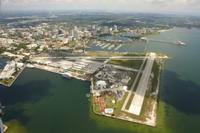
There are 368 primary airports in the United States — and 2,950 nonprimary, or general aviation, airports; the FAA is now studying the roles and functions of these general aviation airports; general aviation airports provide a variety of functions, ranging from access for emergency medical services, disaster relief, aerial firefighting, law enforcement, and border control to agricultural functions, flight training, charter passenger and time-sensitive air cargo services, among others
-
-
Bomb-proof bag for planes' luggage compartment developed

The blast-absorbing bag, named the Fly-Bag, features multiple layers of novel fabrics, composites, and coatings and is designed to be filled with passenger luggage and then placed in the hold of a plane; if one of the pieces of luggage inside the Fly-Bag had a bomb in it and the bomb exploded during the flight, the resulting blast would be absorbed by the bag owing to its complex fabric structure, preventing damage to the plane; fundamental to the design of the bag is the internal elastomeric coating and impregnation of fabric with Shear Thickening Fluids (STF); STFs work by increasing in viscosity in response to impact
-
-
Documents reveal TSA ignored dangers of body scanners
The Electronic Privacy Information Center (EPIC) says that is has official documents that reveal the Transportation Security Administration (TSA) deliberately ignored warnings that airport body scanners pose a health risk; the internal documents and email exchanges show that TSA officials brushed aside concerns that employees raised after noticing that a large number of workers had cancer, strokes, and heart disease after working near the body scanners
-
-
Elderly woman forced to fly without adult diaper
A 95-year old woman dying of leukemia was planning on flying from Florida to her native Michigan so she could spend the last months of her life closer to her family cemetery plot; she was subjected to a 45-minute security examination at a Florida airport; two female agents discovered that the wheel-chair bound woman was wearing a Depend adult diaper, and insisted that unless the diaper was removed, the woman would not be allowed to fly
-
-
TSA hopes to limit child patdowns
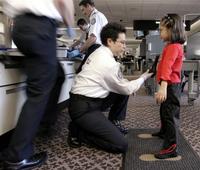
On Wednesday the head of Transportation security Administration (TSA) said the agency was working to make security screening procedures less intrusive for small children; airport screeners will be instructed to make repeated attempts to screen children using electronic methods; the agency hopes that this will limit, but not eliminate, the number of children receiving pat downs
-
-
EU lawyers say U.S. – EU plans air passenger database illegal
A British newspaper has obtained a confidential government document that reveals a legal opinion stating that the U.S.-EU air passenger database plan is “not compatible with fundamental rights” ; DHS and European officials had reached an agreement to share the personal information of passengers including credit card numbers, travel plans, birth dates, and addresses
-
-
Houston police nab TSA thief
In a sting operation, Houston police office arrested a Transportation Security Administration (TSA) screener for stealing from passengers at the city’s Intercontinental Airport; Houston’s Intercontinental Airport has had a history of reported thefts; in August 2003 local police arrested another TSA screener for stealing items from passenger’s bags
-
-
House wants to know about racial profiling at Newark airport
After a federal report revealed that behavior detection officers (BDOs) at New Jersey’s Newark airport routinely used racial profiling to screen passengers, the heads of the House Homeland Security Committee are demanding answers; according to the January 2010 report, in an effort to boost its performance numbers and appear productive, Newark’s BDO unit began singling out Hispanic passengers for additional screening, searches, and questioning in 2008 and 2009
-
-
U.K. bans UPS air cargo screening
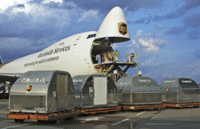
The U.K. government appears to have lost confidence in the security screening procedure of UPS – and has now banned UPS from screening air cargo at some facilities in the United Kingdom; last year, a printer filled with explosives was found on a UPS U.S.-bound flight — but the printer was found not because of UPS screnning but owing to a tip-off from an informer; in March, the U.K. security services placed a fake bomb on an Istanbul-bound UPS flight, and the bomb made it to Turkey without being detected
-
-
Mud triggers Logan alarm
Scanning machines at Logan Airport detected minute traces of nitrates in a checked luggage, and sounded the alarm; two gates were evacuated as a precaution; police found that the nitrates emanated from mud sample a Honk Kong University doctoral student was carrying in the luggage; the samples were to be used in research
-
-
Airport Checkpoint of the Future unveiled
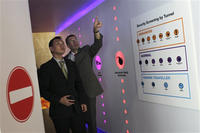
Attendees of the 67th annual Air Transport Association (IATA) annual meeting and World Air Transport Summit in Singapore got a first look at a prototype version of the airport security Checkpoint of the Future; the prototype checkpoint is specifically designed to allow passengers to pass through without having to remove their shoes or get patted down; to make travelling more pleasant and less invasive, the new security checkpoint is outfitted with a suite of sophisticated sensors including eye scanners, x-rays, and metal and liquid detectors
-
More headlines
The long view
New Technology is Keeping the Skies Safe
DHS S&T Baggage, Cargo, and People Screening (BCP) Program develops state-of-the-art screening solutions to help secure airspace, communities, and borders
